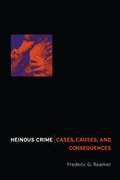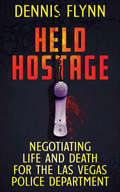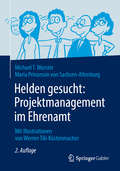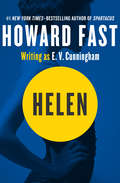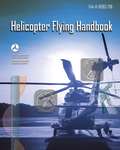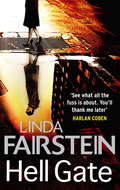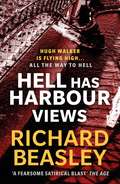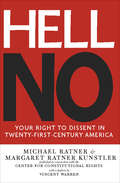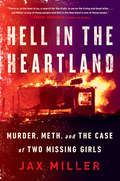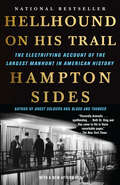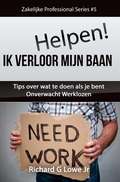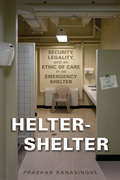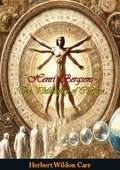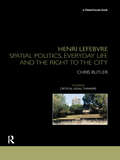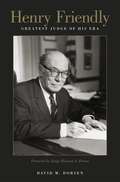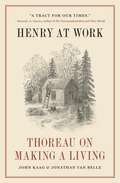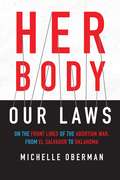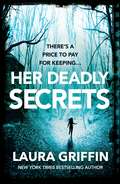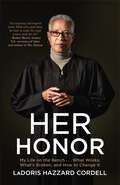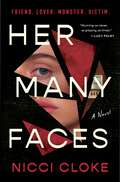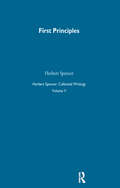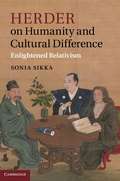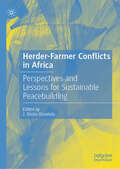- Table View
- List View
Heinous Crime: Cases, Causes, and Consequences
by Reamer Frederic G.What circumstances lead someone to commit murder, rape, or acts of child molestation? Why does society have such a deep-seated wish for vengeance against perpetrators of heinous crimes? Can those found guilty of such crimes ever be rehabilitated? Officials of the criminal justice system, politicians, and ordinary citizens argue about possible solutions to these controversial and vital questions, with little agreement. This book offers innovative perspectives on the difficult issues concerning a civilized society's response to offenders guilty of heinous crimes.
Heinous Crime: Cases, Causes, and Consequences
by Frederic G. ReamerWhat circumstances lead someone to commit murder, rape, or acts of child molestation? Why does society have such a deep-seated wish for vengeance against perpetrators of heinous crimes? Can those found guilty of such crimes ever be rehabilitated? What are the long-term consequences of incarceration, for inmates and society? Officials of the criminal justice system, politicians, and ordinary citizens argue about possible answers to these controversial and vital questions, with little agreement. Violent crime and overflowing prisons continue to be unfortunate aspects of our society as the criminal justice system struggles to develop a coherent strategy to deal with heinous crimes. This book offers innovative perspectives on the difficult issues concerning a civilized society's response to offenders guilty of heinous crimes. It considers specific cases and the chilling accounts of victims and the criminals themselves. In providing detailed strategies for prevention and rehabilitation, Frederic G. Reamer draws on his extensive experience as a member of the Rhode Island Parole Board, where he has heard more than 13,000 cases, and as a social worker in correctional facilities. He examines the psychological and social factors that lead individuals to commit reprehensible crimes, arguing that a fuller understanding of different criminal types is crucial to developing successful answers to the problem of heinous crimes. Closely looking at various criminal typologies, Reamer examines the effectiveness and rationale of various responses, including revenge and retribution, imprisonment for public safety, rehabilitation, and restorative justice.
Held Hostage: Negotiating Life and Death for the Las Vegas Police Department
by Dennis FlynnThis &“riveting true life account&” goes inside the life-or-death world of a Las Vegas police crisis negotiator: &“a must read" (Gary W. Noesner, Chief, FBI Crisis Negotiation Unit, author of Stalling For Time). What do you say to prevent someone from committing &“suicide-by-cop&”? How do you talk someone down when he&’s pointing a gun at a hostage? What tactics do you use when lives depend on your words? Veteran police negotiator Lieutenant Dennis Flynn spent nearly two decades responding to more than a thousand high-intensity incidents with the Crisis Negotiations Team in Las Vegas, Nevada. He approached every scenario with the same goal: bring everyone out alive. This vivid memoir offers a rare, behind-the-scenes view of the life-and-death situations that police negotiators face on a daily basis. Taking readers through both exhilarating successes and tragic failures, Flynn offers a guided tour of the extreme and potentially deadly side of Sin City.
Helden gesucht: Mit Illustrationen von Werner Tiki Küstenmacher
by Michael T. Wurster Maria Prinzessin von Sachsen-Altenburg Werner Tiki KüstenmacherIn Helden gesucht zeigen die beiden Autoren, mit welchen Methoden man Projekte im Ehrenamt erfolgreich leitet und wie gewöhnliche Menschen dazu in der Lage sein können, Außergewöhnliches zu vollbringen. Zugleich ermutigen die Autoren dazu, das Projektmanagement-Know-how in ehrenamtlichen Projekten zu vertiefen und zu trainieren. Der Titel „Helden gesucht“ wird dabei zu einem Leitmotiv: Mithilfe spannender Helden-Geschichten wird einprägsam veranschaulicht, wie man Projekte souverän meistert und dabei sogar ein Stück weit die Welt retten kann.
Helen
by Howard FastA lawyer scrambles to save a judge-killing hooker from the gallows No women have been hanged in San Verdo since 1921, but after four decades it looks like that&’s about to change. Helen Pilasky is far from a sympathetic defendant. She&’s a known prostitute, and there is strong evidence that she murdered Judge Alexander Knowton, a supreme court justice beloved statewide. More than one hundred thousand people live in San Verdo, and nearly all of them want Helen Pilasky&’s neck. It is Blake Eddyman&’s job to save her. A well-off lawyer whose once promising career has stalled, Blake is caught between his ambition and his fear of failure. Saving Helen seems impossible, but he can&’t refuse the job. She faces a charge of murder in the first degree. If convicted, the sentence is automatic. Only Blake stands between this enigmatic young woman and the hangman. This ebook features an illustrated biography of Howard Fast including rare photos from the author&’s estate.
Helicopter Flying Handbook: FAA-H-8083-21B (Asa Faa Handbook Ser.)
by Federal Aviation AdministrationAn official publication of the Federal Aviation Administration, this is the ultimate technical manual for anyone who flies or wants to learn to fly a helicopter.If you&’re preparing for private, commercial, or flight instruction pilot certificates, it&’s more than essential reading—it&’s the best possible study guide available, and its information can be lifesaving. In authoritative and easy-to-understand language, here are explanations of general aerodynamics and the aerodynamics of flight, navigation, communication, flight controls, flight maneuvers, emergencies, and more.Also included is an extensive glossary of terms ensuring that even the most technical language can be easily understood. Helicopter Flying Handbook is an indispensable text for any pilot who wants to operate a helicopter safely in a range of conditions. Chapters cover a variety of subjects including helicopter components, weight and balance, basic flight maneuvers, advanced flight maneuvers, emergencies and hazards, aeronautical decision making, night operations, and many more. With full-color illustrations detailing every chapter, this is a one-of-a-kind resource for pilots and would-be pilots.
Hell Gate (Alexandra Cooper #12)
by Linda FairsteinNew York City politics have always been filled with intrigue and shady deals. Assistant DA Alex Cooper and her NYPD colleagues find themselves investigating a shipwreck involving human cargo - illegally trafficked immigrants - at the same time a sex scandal threatens the career of a promising young congressman. When Alex discovers that a young woman who died in the wreck and the congressman's murdered lover have the same tattoo - the brand of the mastermind behind the trafficking operation - she realizes that the city's entire political landscape hangs in the balance.
Hell Has Harbour Views
by Richard Beasley'A fearsome satirical blast’ Sunday AgeSydney, 2001: Hugh Walker has it all. He’s a successful young lawyer with a beautiful girlfriend and a million dollar office view… So why does he identify more with his resident cockroach than Atticus Finch, his childhood hero? Once upon a time he was the defender of the abused, the voice of the oppressed. But now he's turning a blind eye to suspect time sheets, championing the powerful against the powerless, and not being entirely honest with his girlfriend. Has his good side deserted him? Is there a way back? A bitingly satirical novel about one man’s search for his soul … in the most soulless of places. Praise for Hell Has Harbour Views ‘A sharp-clawed comedy’ Sydney Morning Herald ‘The funniest, most unutterably savage lawyer joke ever’ John Birmingham ‘Beasley exercises brutal wit in deconstructing modern angst … His spirited whistleblowing is a tonic’ Weekend Australian
Hell No: Your Right to Dissent in Twenty-First-Century America
by Michael Ratner Margaret Ratner Kunstler&“Compelling and useful reading&” for activists, protest groups, and individuals, from America&’s leading constitutional rights group (Booklist). In the age of terrorism and under the current administration, the United States has become a much more dangerous place—for activists and dissenters, whose First Amendment rights are all too frequently abridged by the government. In Hell No, the Center for Constitutional Rights, the country&’s leading public interest law organization, offers a timely report on government attacks on dissent and protest in the United States, along with a readable and essential guide for activists, teachers, grandmothers, and anyone else who wants to oppose government policies and actions. Hell No explores the current situation of attacks upon and criminalization of dissent and protest, from the surveillance of activists to the disruption of demonstrations, from the labeling of protestors as &“terrorists,&” to the jailing of those the government claims are giving &“material support&” to its perceived enemies. Offering detailed, hands-on advice on everything from &“Sneak and Peek&” searches to &“Can the Government Monitor My Text Messages?&” and what to do &“If an Agent Knocks,&” Hell No lays out several key responses that every person should know in order to protect themselves from government surveillance and interference with their rights. Concluding with the controversial 2008 Mukasey FBI Guidelines, which currently regulate the government&’s domestic response to dissent, Hell No is an indispensable tool in the effort to give free speech and protest meaning in a post-9/11 world.
Hell in the Heartland: Murder, Meth, and the Case of Two Missing Girls
by Jax Miller&“There is, in the best of us, a search for the truth, to serve the living and dead alike...Jax Miller is one of those people and Hell in the Heartland is one of those books.&”—Robert Graysmith, New York Times bestselling author of ZodiacAs seen in HuffPost • OK! Magazine • CrimeReads • LitHub's "Best New Summer Books"S-Town meets I'll Be Gone in the Dark in this stranger-than-fiction cold case from rural Oklahoma that has stumped authorities for two decades, concerning the disappearance of two teenage girls and the much larger mystery of murder, possible police cover-up, and an unimaginable truth...On December 30, 1999, in rural Oklahoma, sixteen-year-old Ashley Freeman and her best friend, Lauria Bible, were having a sleepover. The next morning, the Freeman family trailer was in flames and both girls were missing.While rumors of drug debts, revenge, and police corruption abounded in the years that followed, the case remained unsolved and the girls were never found.In 2015, crime writer Jax Miller--who had been haunted by the case--decided to travel to Oklahoma to find out what really happened on that winter night in 1999, and why the story was still simmering more than fifteen years later. What she found was more than she could have ever bargained for: evidence of jaw-dropping levels of police negligence, entire communities ravaged by methamphetamine addiction, and a series of interconnected murders with an ominously familiar pattern.These forgotten towns were wild, lawless, and home to some very dark secrets.
Hellhound On His Trail: The Electrifying Account of the Largest Manhunt In American History
by Hampton SidesNATIONAL BESTSELLER • On April 4, 1968, James Earl Ray shot Martin Luther King Jr. at the Lorraine Motel. The nation was shocked, enraged, and saddened. As chaos erupted across the country and mourners gathered at King's funeral, investigators launched a sixty-five day search for King&’s assassin that would lead them across two continents—from the author of Blood and Thunder and Ghost Soldiers.With a blistering, cross-cutting narrative that draws on a wealth of dramatic unpublished documents, Hampton Sides, bestselling author of Ghost Soldiers, delivers a non-fiction thriller in the tradition of William Manchester's The Death of a President and Truman Capote's In Cold Blood. With Hellhound On His Trail, Sides shines a light on the largest manhunt in American history and brings it to life for all to see.With a New Afterword
Helpen! Ik heb mijn baan verloren
by Richard G Lowe JrDe meesten van ons zijn trots op ons werk en onze baan. We moeten een baan hebben om onze gezinnen te voeden, de huur te betalen, de auto gerepareerd te houden en af en toe een paar luxe te kopen. We raken verbonden met mensen op het werk en hebben vaak het gevoel dat de plek onze tweede thuis is. Dit zou niet moeten verbazen, omdat velen van ons een derde of meer van ons leven op kantoor doorbrengen. Zo kan het plotselinge verlies van werkgelegenheid darmslachtig zijn, deprimerend en, afhankelijk van de financiële situatie van een persoon, een nijpende noodsituatie. Voor degenen die van salaris naar salaris leven, kan het plotselinge verlies van werk betekenen dat ze hun huis verliezen of niet eten. Het doel van dit boek is om u te helpen, een werknemer die onlangs is beëindigd of voelt dat het komt, de antwoorden krijgt die u nodig hebt om uw overgang van de ene naar de andere functie zo soepel mogelijk te laten verlopen.
Helping Soldiers Leverage Army Knowledge, Skills, and Abilities in Civilian Jobs
by Melissa A. Bradley Laura Werber Michael G. Shanley Cate Yoon Ellen M. Pint Eric J. Duckworth Jeffrey B. Wenger Jonathan Welch Nicole H. Curtis Tepring Piquado Trinidad BelecheThis report discusses the results of occupation surveys administered to soldiers in selected Army military occupational specialties (MOSs) to assess the level and importance of the knowledge, skills, and abilities needed in these MOSs and to develop better crosswalks between military and civilian occupations. The report identifies both a broader range of military-civilian occupation matches and higher-quality matches than existing crosswalks.
Helter-Shelter: Security, Legality, and an Ethic of Care in an Emergency Shelter
by Prashan RanasingheHelter-Shelter is an ethnographic account of the manner in which an emergency shelter is governed on a daily basis, from the perspective of the personnel who are employed and tasked with providing care. Prashan Ranasinghe focuses on how the founding ethos of the shelter, an ethic of care, is conceptualized and practiced by examining its successes and failures. Ranasinghe reveals how this logic is diluted and adulterated because of two other important logics, security and legality, which, working alongside, take precedence and trump the import of care. The care that is deployed is heavily legalized and securitized and it is also administered inconsistently and idiosyncratically. As a result, disorder and confusion pervade the shelter. Helter-Shelter offers a unique perspective on the delivery of care, and how this laudable intention faces such daunting challenges.
Henri Bergson: The Philosophy of Change
by Herbert Wildon CarrImmerse yourself in the revolutionary ideas of one of the most influential philosophers of the early 20th century with Herbert Wildon Carr's Henri Bergson: The Philosophy of Change. This illuminating work offers a comprehensive and accessible introduction to the thought of Henri Bergson, whose concepts of time, consciousness, and creativity have profoundly impacted modern philosophy.Herbert Wildon Carr, a respected philosopher and Bergson scholar, provides a detailed and insightful exploration of Bergson's philosophy. Henri Bergson: The Philosophy of Change delves into the core ideas that define Bergson's work, such as his distinction between clock time and lived time (durée), the nature of creative evolution, and the concept of élan vital (vital impulse).Carr expertly unpacks Bergson's complex theories, making them accessible to readers new to his work while offering deep insights for those already familiar with his philosophy. The book explores how Bergson's ideas challenge traditional mechanistic views of the universe, proposing instead a dynamic and fluid understanding of reality.Henri Bergson: The Philosophy of Change also examines Bergson's influence on a wide range of disciplines, from psychology and biology to literature and the arts. Carr discusses how Bergson's ideas have inspired and intersected with the work of other prominent thinkers and how his philosophy continues to resonate in contemporary debates about consciousness and the nature of time.Join Herbert Wildon Carr on a journey through the innovative and transformative philosophy of Henri Bergson, and discover how his ideas on change and creativity continue to inspire and challenge our perceptions of reality. Henri Bergson: The Philosophy of Change is a timeless exploration of one of philosophy's most dynamic thinkers.
Henri Lefebvre: Spatial Politics, Everyday Life and the Right to the City (Nomikoi: Critical Legal Thinkers)
by Chris ButlerWhile certain aspects of Henri Lefebvre’s writings have been examined extensively within the disciplines of geography, social theory, urban planning and cultural studies, there has been no comprehensive consideration of his work within legal studies. Henri Lefebvre: Spatial Politics, Everyday Life and the Right to the City provides the first serious analysis of the relevance and importance of this significant thinker for the study of law and state power. Introducing Lefebvre to a legal audience, this book identifies the central themes that run through his work, including his unorthodox, humanist approach to Marxist theory, his sociological and methodological contributions to the study of everyday life and his theory of the production of space. These elements of Lefebvre’s thought are explored through detailed investigations of the relationships between law, legal form and processes of abstraction; the spatial dimensions of neoliberal configurations of state power; the political and aesthetic aspects of the administrative ordering of everyday life; and the ‘right to the city’ as the basis for asserting new forms of spatial citizenship. Chris Butler argues that Lefebvre’s theoretical categories suggest a way for critical legal scholars to conceptualise law and state power as continually shaped by political struggles over the inhabitance of space. This book is a vital resource for students and researchers in law, sociology, geography and politics, and all readers interested in the application of Lefebvre’s social theory to specific legal and political contexts.
Henry Friendly, Greatest Judge of His Era
by David M. DorsenFriendly served on the Second Circuit from 1959 to 1986. In the foreword, Judge Richard A. Posner refers to his own skeptical statements about the utility of biographies of judges; pointedly, he reverses that opinion completely with regard to this biography. Washington, D. C. -based attorney Dorsen draws on extensive research and interviews to provide a thoroughly engaging portrait of a brilliant and esteemed man. Belknap Press is an imprint of Harvard U. Press. Annotation ©2012 Book News, Inc. , Portland, OR (booknews. com)
Henry at Work: Thoreau on Making a Living
by John Kaag Jonathan van BelleWhat Thoreau can teach us about working—why we do it, what it does to us, and how we can make it more meaningfulHenry at Work invites readers to rethink how we work today by exploring an aspect of Henry David Thoreau that has often been overlooked: Thoreau the worker. John Kaag and Jonathan van Belle overturn the popular misconception of Thoreau as a navel-gazing recluse who was scornful of work and other mundanities. In fact, Thoreau worked hard—surveying land, running his family&’s pencil-making business, writing, lecturing, and building his cabin at Walden Pond—and thought intensely about work in its many dimensions. And his ideas about work have much to teach us in an age of remote work and automation, when many people are reconsidering what kind of working lives they want to have.Through Thoreau, readers will discover a philosophy of work in the office, factory, lumber mill, and grocery store, and reflect on the rhythms of the workday, the joys and risks of resigning oneself to work, the dubious promises of labor-saving technology, and that most vital and eternal of philosophical questions, &“How much do I get paid?&” In ten chapters, including &“Manual Work,&” &“Machine Work,&” and &“Meaningless Work,&” this personal, urgent, practical, and compassionate book introduces readers to their new favorite coworker: Henry David Thoreau.
Her Body, Our Laws: On the Front Lines of the Abortion War, from El Salvador to Oklahoma
by Michelle ObermanWith stories from the front lines, a legal scholar journeys through distinct legal climates to understand precisely why and how the war over abortion is being fought.Drawing on her years of research in El Salvador—one of the few countries to ban abortion without exception—legal scholar Michelle Oberman explores what happens when abortion is a crime. Oberman reveals the practical challenges raised by a thriving black market in abortion drugs, as well as the legal challenges to law enforcement. She describes a system in which doctors and lawyers collaborate in order to identify and prosecute those suspected of abortion-related crimes, and the troubling results of such collaboration: mistaken diagnoses, selective enforcement, and wrongful convictions.Equipped with this understanding, Oberman turns her attention to the United States, where the battle over abortion is fought almost exclusively in legislatures and courtrooms. Beginning in Oklahoma, one of the most pro-life states, and through interviews with current and former legislators and activists, she shows how Americans voice their moral opposition to abortion by supporting laws that would restrict it. In this America, the law is more a symbol than a plan.Oberman challenges this vision of the law by considering the practical impact of legislation and policies governing both motherhood and abortion. Using stories gathered from crisis pregnancy centers and abortion clinics, she unmasks the ways in which the law already shapes women’s responses to unplanned pregnancy, generating incentives or penalties, nudging pregnant women in one direction or another.In an era in which every election cycle features a pitched battle over abortion’s legality, Oberman uses her research to expose the limited ways in which making abortion a crime matters. Her insight into the practical consequences that will ensue if states are permitted to criminalize abortion calls attention to the naïve and misguided nature of contemporary struggles over abortion’s legality.A fresh look at the battle over abortion law, Her Body, Our Laws is an invitation to those on all sides of the issue to move beyond the incomplete discourse about legality by understanding how the law actually matters.
Her Deadly Secrets: A nailbitingly suspenseful thriller that will have you on the edge of your seat!
by Laura GriffinWith her signature breathless pacing and suspenseful twists and turns, 'Laura Griffin never fails to put me on the edge of my seat' (USA TODAY).Laura Griffin's pulse-pounding new thriller, Hidden, is now available to preorder! Just search 9781472276001!A young private investigator finds out the price of keeping deadly secrets when a vicious killer sets his sights on her in this pulse-pounding thriller from the New York Times bestselling author of the Tracers series.She alone may hold the key to finding a vicious murderer... Private investigator Kira Vance spends her days navigating the intricate labyrinth of Houston's legal world. But, however shadowy its players and dark its secrets, the last thing she expects is for a meeting with her top client to end in a bloodbath. The police have no suspects but one thing is clear: a killer has Kira in his sights. Fiercely independent, Kira doesn't expect - or want - help from anyone, least of all an unscrupulous lawyer and his elite security team. Instead, she launches her own investigation, hoping to uncover the answers that have eluded the police. But as Kira's hunt for clues becomes more and more perilous, she realizes that she must take help wherever she can find it if she wants to stay alive...Raves for Laura Griffin:'Desperate Girls is a nail-biting read from the very first page to the final, shocking twist. I could not put this book down' Melinda Leigh'Griffin pulls out all the stops in a phenomenal twist ending that will leave readers stunned' Publishers WeeklyDon't miss Laura's other gripping romantic thrillers, including Desperate Girls and Stone Cold Heart, available now!
Her Honor: My Life on the Bench...What Works, What's Broken, and How to Change It
by LaDoris Hazzard CordellIn Her Honor, Judge LaDoris Hazzard Cordell provides a rare and thought-provoking insider account of our legal system, sharing vivid stories of the cases that came through her courtroom and revealing the strengths, flaws, and much-needed changes within our courts.Judge Cordell, the first African American woman to sit on the Superior Court of Northern California, knows firsthand how prejudice has permeated our legal system. And yet, she believes in the system. From ending school segregation to legalizing same-sex marriage, its progress relies on legal professionals and jurors who strive to make the imperfect system as fair as possible.Her Honor is an entertaining and provocative look into the hearts and minds of judges. Cordell takes you into her chambers where she haggles with prosecutors and defense attorneys and into the courtroom during jury selection and sentencing hearings. She uses real cases to highlight how judges make difficult decisions, all the while facing outside pressures from the media, law enforcement, lobbyists, and the friends and families of the people involved. Cordell’s candid account of her years on the bench shines light on all areas of the legal system, from juvenile delinquency and the shift from rehabilitation to punishment, along with the racial biases therein, to the thousands of plea bargains that allow our overburdened courts to stay afloat—as long as innocent people are willing to plead guilty. There are tales of marriages and divorces, adoptions, and contested wills—some humorous, others heartwarming, still others deeply troubling.Her Honor is for anyone who’s had the good or bad fortune to stand before a judge or sit on a jury. It is for true-crime junkies and people who vote in judicial elections. Most importantly, this is a book for anyone who wants to know what our legal system, for better or worse, means to the everyday lives of all Americans.
Her Many Faces: A Novel
by Nicci Cloke“Stunning: so clever, so gripping, so timely.” — Lucy FoleyWhen four influential members are poisoned at London’s most exclusive private club, a young waitress is charged with their murder. Her personal life and upbringing are dissected, and five men begin to question how well they really knew her.FIVE MEN. FIVE STORIES. BUT ARE THEY READY FOR HERS?Her father remembers the sweet schoolgirl.Her childhood friend bonded over a shared fascination with conspiracy theories.Her lover regrets ever falling for her.Her lawyer believes she is hiding something.A journalist is convinced he knows exactly who she is: a cold-blooded killer.But which is the true face of Katherine Cole? The reality lies somewhere between these very different perspectives.UNRAVEL THE MYSTERY THAT’S GOT TOP AUTHORS TALKING!
Herbert Spencer: Collected Writings
by Herbert SpencerHerbert Spencer (1820-1903) was regarded by the Victorians as the foremost philosopher of the age, the prophet of evolution at a time when the idea had gripped the popular imagination. Until recently Spencer's posthumous reputation rested almost excusively on his social and political thought, which has itself frequently been subject to serious misrepresentation. But historians of ideas now recognise that an acquaintance with Spencer's thought is essential for the proper understanding of many aspects of Victorian intellectual life, and the present selection is designed to answer this need. It provides a cross-section of Spencer's works from his more popular and approachable essays to a number of the volumes of the Synthetic Philosophy itself. Volume V: First Principles.
Herder on Humanity and Cultural Difference
by Sonia SikkaHerder is often criticized for having embraced cultural relativism, but there has been little philosophical discussion of what he actually wrote about the nature of the human species and its differentiation through culture. This book focuses on Herder's idea of culture, seeking to situate his social and political theses within the context of his anthropology, metaphysics, epistemology, ethics, theory of language and philosophy of history. It argues for a view of Herder as a qualified relativist, who combined the conception of a common human nature with a belief in the importance of culture in developing and shaping that nature. Especially highlighted are Herder's understanding of the relativity of virtue and happiness, and his belief in the impossibility of constructing a single best society. The book will appeal to a wide range of readers interested both in Herder and in Enlightenment culture more generally.
Herder-Farmer Conflicts in Africa: Perspectives and Lessons for Sustainable Peacebuilding
by J. Shola OmotolaThis book seeks to deepen empirical understandings of herder–farmer conflicts in Africa from the perspective of peacebuilding. Thus, the focus of the book is on the manifestations, causes, consequences and management of these conflicts (responses) by both state and non-state actors and lessons for sustainable peacebuilding. By adopting a comparative approach spanning five countries (Burkina Faso, Cameroon, Nigeria, Sudan and Togo), our study seeks not only to fill the gap, but also expand the frontier of knowledge on the subject, exploring important cross-cutting issues such as human rights, rule of law, gender and youth. The interconnections between these conflicts and security, safety and development at all levels underscore the urgency and pertinence of this study.
